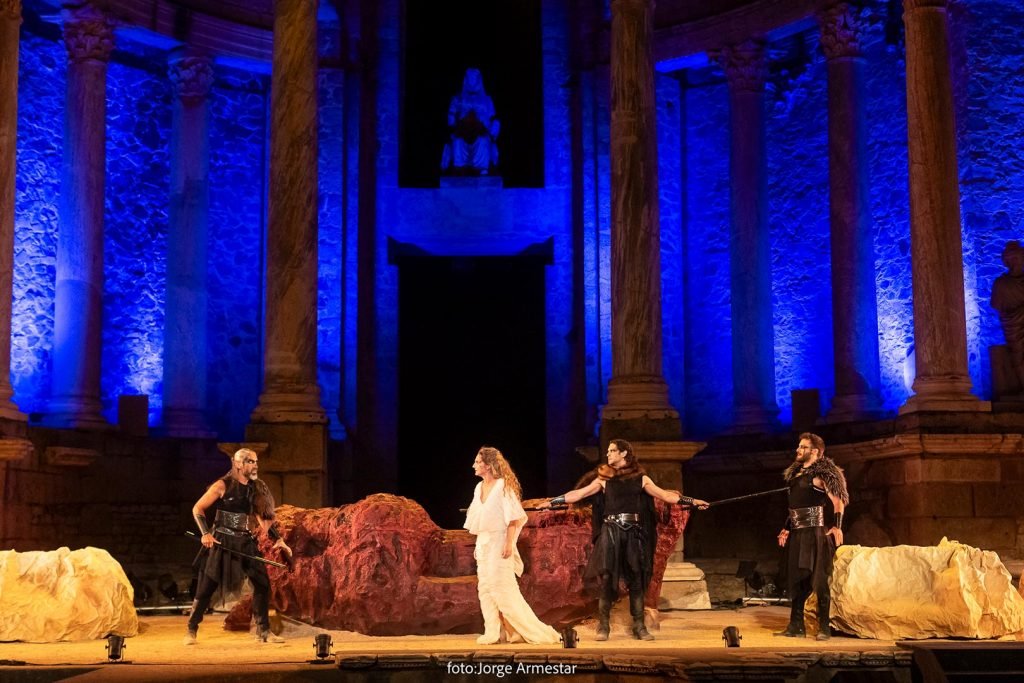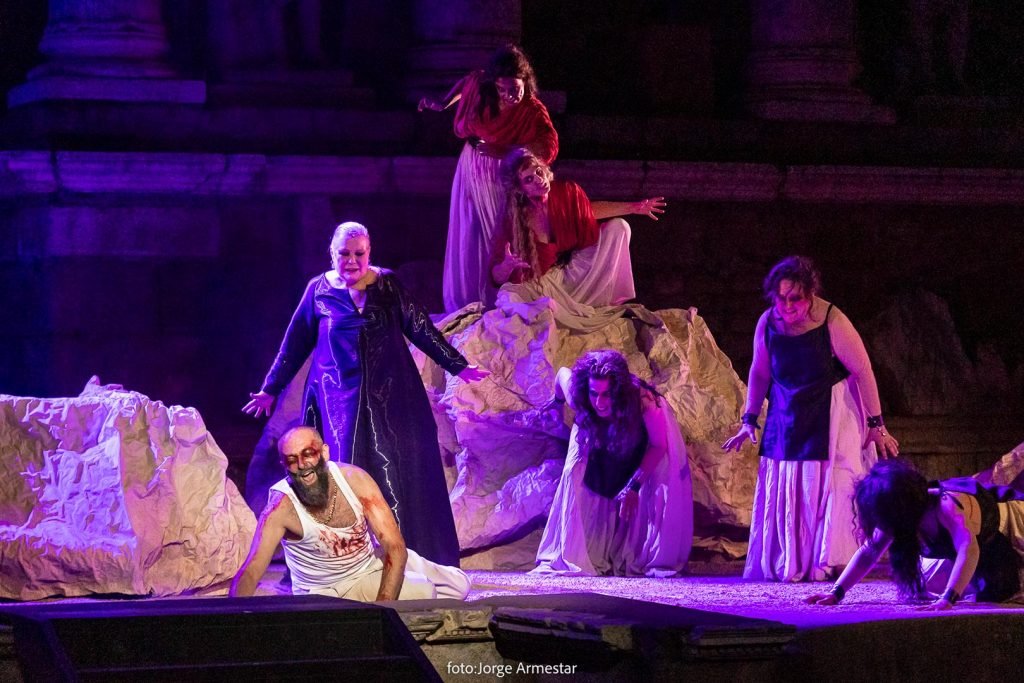When theater becomes a mirror of the human psyche and dynamics, it breaks the gag that silences victims. The eternity of a myth that affects us all
By Rosalba Panzieri
In the evocative setting of the Roman Theater in Ostia, the first edition of the Ostia Antica Theater Festival concluded with "Ifigenia," a work that has the power to shake consciences. Ifigenia is an international creation signed by Spanish director Eva Romero and written by Silvia Zarco. The project is the result of a collaboration between Teatro di Roma and the prestigious Festival Internacional de Teatro Clásico de Mérida and stands out as a bridge between cultures, but above all between eras and states of the soul. When Aristotle, in the "Poetics," criticized the transition of Iphigenia from a desperate and unsuspecting victim to a heroine who voluntarily sacrifices herself for her homeland, he highlighted one of the most powerful dynamics of human nature: deception.
Eva Romero shows the nature of betrayal
The tragedy of Iphigenia, sacrificed by her father Agamemnon to gain the favor of the gods in the Trojan War, is not only an ancient story. It is an archetypal wound that continues to pulsate in our imagination. The girl is tricked by her father into believing that she will be given in marriage to Achilles, only to lure her to Tauride, where she will instead be sacrificed to the goddess Artemis in order to obtain favorable winds toward Troy. The entire fleet led by her father yearns for her death, only Achilles, to no avail, opposes it. The illusion of happiness turns out to be a project of death. Ifigenia, first pleading, then despairing, chooses to embrace her father's logic and agrees to immolate herself for her people.

Eva Romero, with her intense and visionary direction, transforms the myth into a tool for psychological and social investigation, bringing to the stage not only the pain, but also the silence that envelops it and the deception within which it matures. Through a universal language and a narrative that weaves past and present, Iphigenia addresses the theme of gender violence with a rare depth, allowing us to investigate the effects of manipulation and deception. The figure of Iphigenia becomes symbols of a sacrifice that is repeated, from generation to generation, in different forms but with the same outcome: the denial of the female voice and adherence to the logic of the executioner.
A reflection on the collective psyche
The play does not merely expose the erosion of identity that betrayal with deception generates in the victim. It interrogates. It digs. It forces us to confront the inner dynamics that fuel violence: guilt, emotional repression, identification with the perpetrator. In this sense, Ifigenia is also a journey into the collective psyche, a theatrical ritual that invites us to recognize our shadows and transform them. "My daughter is coming in her wedding dress and I am going to kill her," says Agamemnon, a sentence that resonates like a punch in the stomach. It is not only the emblem of a tragedy, but the symbol of a psychological mechanism that still condemns many women and innocents to silence and suffering.
Ifigenia's sacrifice is not only a tragic act, but a powerful example of affective manipulation and systemic deception. Her father Agamemnon does not directly impose death on her, but constructs a need, making her believe that her sacrifice is necessary for the common good, for glory, for the salvation of Greece. He offers her a meaning, a heroic narrative, and she embraces it so as not to face the truth of being betrayed by those she loved.
This dynamic is psychologically devastating. Ifigenia is deluded, seduced by an ideal, and then killed. It is a form of ancient gaslighting, where reality is distorted to make the unacceptable acceptable. The young woman not only accepts the sacrifice, but claims it, turns it into a voluntary act, because the alternative would be to recognize the abyss, namely that her father is a cruel politician, willing to do anything for power.
This identification of the victim with the persecutor is known in psychology as Stockholm syndrome. Ifigenia does not fight the perpetrator, but justifies him, loves him, defends him. It is an extreme defense mechanism: better to die with the illusion of love than to live with the knowledge of betrayal.
The contemporary resonance of myth from family to society
Euripides, with Iphigenia in Aulis, offers us a disturbing and profound portrait of the human psyche-a work that anticipates themes of manipulation, trauma and resilience.
From a contemporary perspective, the story of Iphigenia addresses several dynamics in which we are immersed. Emotional manipulation in family relationships, where need is artificially created to gain obedience. Power narratives, where female sacrifice is romanticized and made necessary to maintain order.
Psychological survival strategies, where the victim clings to the illusion so as not to collapse under the weight of the truth.
Euripides, with Iphigenia in Aulis, gives us a disturbing and profound portrait of the human psyche, with a work that anticipates themes of manipulation, trauma and resilience, making it still extraordinarily relevant today.

Theater as a healing space
The cast, composed of performers of extraordinary emotional intensity, does not act: it embodies. Every gesture, every word, every silence is charged with psychic meaning. María Garralón, Juanjo Artero, Laura Moreira and the other actors do not bring to the stage characters, but states of the soul. And the audience, faced with this epiphany can process the trauma, recognize their own and others' wounds and begin the journey toward healing. "Through a universal language and a moving story," says the director, "we are invited to reflect on our past while hoping to build a more just and equitable future for all. And perhaps, in this very space suspended between tragedy and catharsis, we can begin to rewrite the script of our humanity. In the dialogue between myth and contemporaneity, between pain and hope, Ifigenia reminds us that theater is not just art. It is consciousness. It is a political, ethical, human act. It is an invitation to rethink our relationship with power, with memory, with justice.





